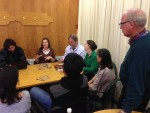These are exciting times for the International Long Term Ecological Research (ILTER) Network, with a robust series of meetings, projects, and initiatives underway. ILTER is a network of networks, with 40 individual national LTER programs joining together to facilitate long-term, site-based ecological and socio-economic research and monitoring.
The mission of the US LTER International Committee (IC) has changed in recent years as the entire ILTER Network has transitioned from being a satellite of the US Long Term Ecological Research (LTER) Network to a self-sustaining network with dozens of member countries, a governance structure, and clear goals. The IC was originally formed in 2003 to support the development of the ILTER Strategic Plan, which was adopted in 2006. Since the successful implementation of this Strategic Plan, the IC has focused on fostering research and education initiatives that capitalize on the opportunities made available through the US LTER’s membership in the ILTER.
The goals of the committee are to facilitate:
- development of research projects and collaborations between the US LTER scientists and ILTER Network colleagues;
- programs to connect the US LTER students (K-12 through graduate) with students associated with LTERs in other countries;
- development of the ILTER Network Information Infrastructure;
- cooperation between the US LTER (as a member of the ILTER) and other global science programs.
One of the signature accomplishments of the US LTER Network is the “globalization” of long-term ecological research through its foundational support for the ILTER. A focused initiative for the IC is to discover new ways in which US LTER members (at all levels) can lead or participate in international long-term research.
Recent activities of the IC include the preparation of a special issue submitted to Ecosphere, participation in the First All Scientists Meeting of the Americas in Valdivia, Chile, and taking part in the ILTER Coordinating Committee and Executive Board meetings.
The next ILTER meeting will be held in conjunction with the European Ecological Federation’s (EEF) 13th Annual Meeting in Rome, Italy, this September (http://eefconference.unisalento.it/index.php/component/content/article?id=2). The Science Committee of ILTER has organized an ILTER Symposium and ILTER Science Meetings, September 24 and 25, 2015. Featured science keynotes, sessions and break-out groups cover global initiatives on socio-ecohydrology led by Kinga Krauze and nitrogen led by Hideaki Shibata (Shibata et al., 2014, AMBIO), a global “tea-bag” decomposition study led by Michael Mirtl and science-policy initiative around greenhouse gas flux and carbon data synthesis led by Tiffany Troxler. US LTER members are invited to submit abstracts for poster presentations that will be available for viewing throughout the EEF, even if you are unable to attend the meeting. An announcement will be released soon.
The next ILTER All Scientists Meeting will be hosted by the South African Environmental Observatory Network (SAEON) in September 2016.
The international committee seeks additional input about how we can increase the awareness of ILTER activities within the US LTER Network and of the collaborative opportunities available to US LTER members. The committee will convene an open workshop at the upcoming 2015 LTER ASM in Estes Park, CO, and invite the US LTER community to participate in developing ideas for advancing the relevance and impact of long term ecological research in the global community.

 Enlarge this image
Enlarge this image